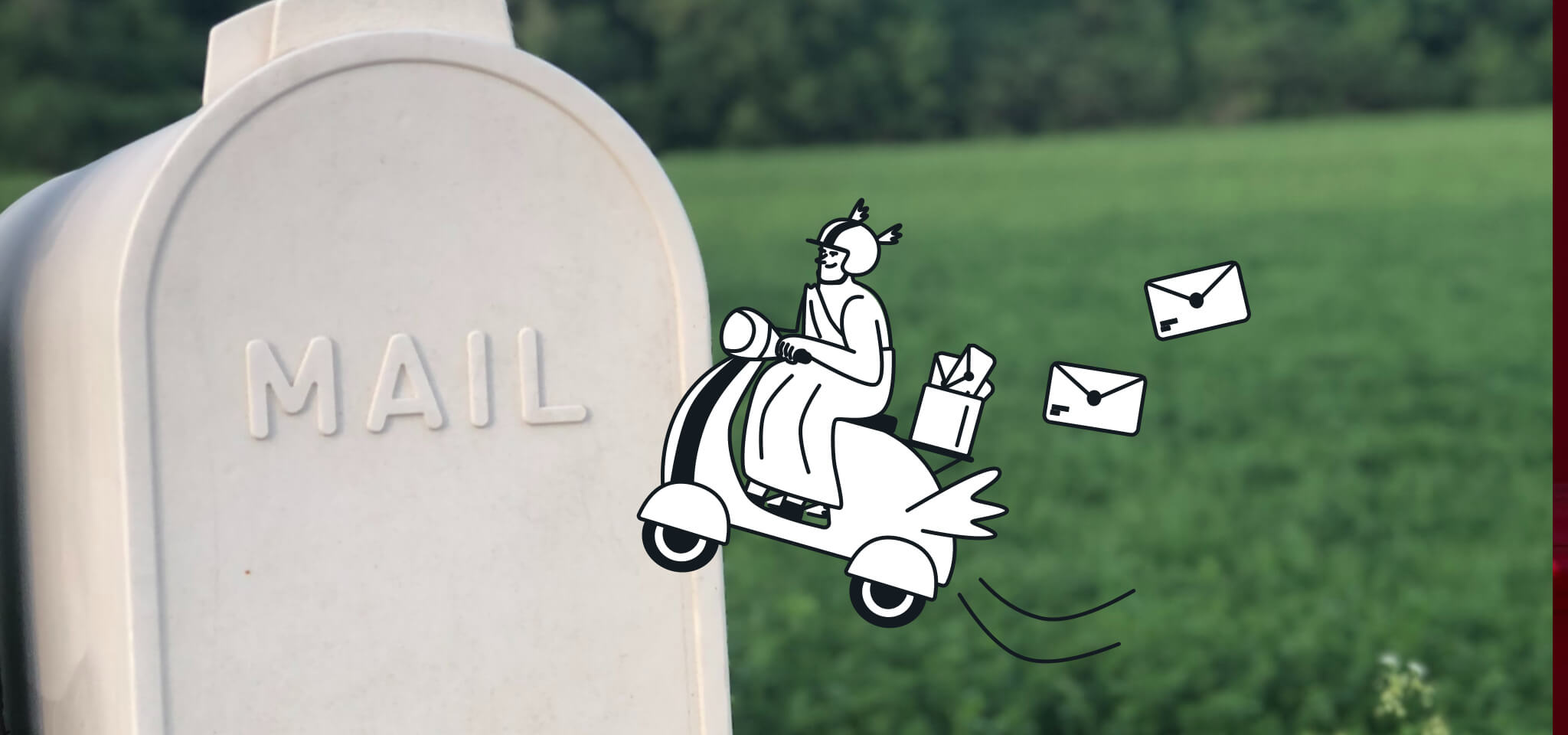Marketing
5 books every email marketing professional should read
Digital marketing isn't as simple as sending a message and watching open rates and click-through rates increase daily. That's why it's essential to continually expand your knowledge as an email marketer and stay up to date on the latest trends, best practices, and tips.

PUBLISHED ON
It’s a must to stay on top of industry trends, especially when technology develops on a daily basis. But how do you do that? You can either check web portals or read books to strengthen your knowledge base.
And, if you’re looking for a good book to help you kick off your email marketing campaign or just need some inspiration, you're in luck! We’ve got five of the best email marketing books that every email marketing professional should read. Some have stood the test of time for as long as 78 years. Each provides important email marketing rules to help your company reach its goals and is available in traditional book form, Kindle, and audio versions. Take a look at our suggestions below, get reading, and work toward mastering the art of email marketing!
Table of contents
1. Permission Marketing: Turning Strangers Into Friends And Friends Into Customers – Seth Godin
2. Being Direct: Making Advertising Pay – Lester Wunderman
3. Buyology – Martin Lindstrom
4. How to Win Friends and Influence People – Dale Carnegie
5. Email Marketing Demystified – Matthew Paulson
Importance of expanding your knowledge as an email marketer
An effective email marketing strategy for business owners is one of the best tools for improving sales, increasing brand awareness, and nurturing customer relationships. But digital marketing isn't as simple as sending a message and watching open rates and click-throughs increase daily. That's why it's essential to continually expand your knowledge as an email marketer and stay up to date on the latest email marketing tips, metrics, and trends.
Other fundamentals like segmentation, marketing automation, deliverability, and personalization give marketers even more ways to find emails that work and grab the attention of their email subscribers. Tapping into these successful email marketing tools can take a good email marketing campaign and make it great. You can do that by reading the best email marketing books, gathering essential information, and implementing it into your digital marketing.
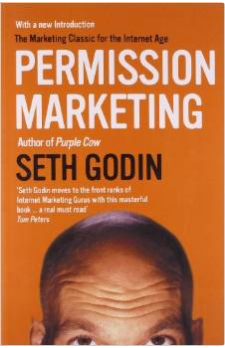
Books for email marketers
Reading calms the mind, helps release stress, develops communication skills, and strengthens knowledge. Check out our list of classics to get the best of email marketing.
1. Permission Marketing: Turning Strangers Into Friends And Friends Into Customers – Seth Godin
In the book, Seth Godin argues that the traditional models of TV, radio, or print advertising are based on interrupting customers and forcing them to see your advertising. This model is becoming less viable due to the saturation of consumers' attention with up to 10K ad messages a day.
According to Seth, the better approach is sending personal, relevant messages to people waiting to hear from you. He dubbed this model permission marketing. It's a process that begins with looking for people who are interested in what you have to offer. You ask for their permission to talk to them regularly, often by giving them an incentive for their permission. Then, you send those people exceptional educational content over time.
Gradually, as trust develops, you can start asking your customers for more information on their needs. Once this trust is established, asking for a sale is trivial because you know what your customers want, and they trust you'll deliver on your promises.
This process mirrors the opt-in email marketing process, which is why email is the channel Seth advocated for permission marketing. Once a person signs up for your newsletter, you have permission to send your messages right into their inbox.
Unlike social media, you own your email list or "permission database," in the words of Seth Godin, rather than renting it from Facebook or Twitter. These advantages show in the returns on email marketing.
Permission marketing isn’t a short-term tactic. It's a strategy that requires investment in time and resources to create high-quality incentives to subscribe to and keep reading emails. However, this investment will often deliver handsome returns, particularly if the lifetime value of a customer is high.
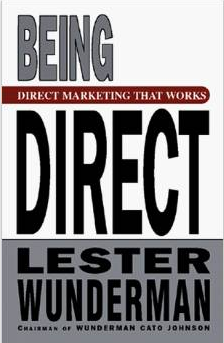
2. Being Direct: Making Advertising Pay – Lester Wunderman
The popular books written by Lester Wunderman are today considered to be must-reads for every self-respecting marketer. There are several reasons why Being Direct has made it to our list. That’s because it's a journey in the mind and life of a great marketer, told casually and autobiographically. Listening to the experiences of the man behind the American Express customer rewards program and the Columbia Record Club is like a course on marketing in itself.
Another key point is you can still apply his lessons in a faster, more connected ecosystem. Wunderman's idea of direct marketing is based on two main principles: People are an end, never a means and direct marketing is data-driven. In short, you should always address the precise needs of your customers – needs that you’ll know, thanks to your data-driven strategy – and never impose what you have to offer.
These simple ideas may seem apparent to most of today's marketers. However, they’re increasingly relevant. Thanks to the new tools the digital revolution has given us – such as online forms and surveys, ecommerce shopping and stores, and automatically generated discount codes – it's become much easier to send personalized content. That can include marketing messages that genuinely interest the recipient, leading to conversion and retention.
Online marketing was the logical next step that direct marketing was waiting for. The inconvenience of maintaining a vast personalized list of contacts or geographic constraints doesn’t exist anymore. And its creator tells us that we should expect more from the digital marketing turn.
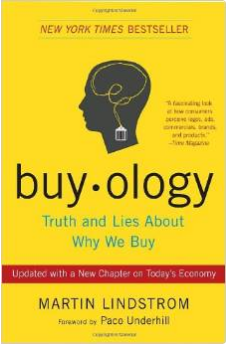
3. Buyology – Martin Lindstrom
This book takes us into a $7M, three-year research project uncovering how the mind reacts to advertising and the role it plays in our buying decisions. Even if science isn’t your thing and words like neuromarketing, fMRI, and amygdala turn you off, it won’t disappoint you.
Lindstrom puts his findings into simple English, "Neuromarketing is still in its infancy… Though it may never be able to tell us exactly where the 'buy button' resides in our brain…it will certainly help predict certain directions and trends that will alter the face and the fate of commerce across the world."
We learn that what we fear as consumers is true: subliminal messages work. Mirror neurons in the brain drive us to imitate the actions of those around us. In retail, we want to buy the lifestyle that models portray through the clothes they wear or the cars they drive. Our minds tend to process and absorb fear-based advertising faster than a message that brings hope.
Lindstrom arms consumers and marketers with the takeaway that branding will become ever more critical in the coming years. As consumers, we're given the knowledge to dissect the messaging we see rationally, while as marketers, it’s the science behind how your audience will react to your messages. At 272 pages, Buyology is a fun, thought-provoking, and educational read.
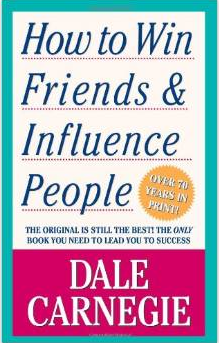
4. How to Win Friends and Influence People – Dale Carnegie
While it might not seem the most obvious choice, this classic from 1937 provides universal and timeless advice on one of the significant challenges we all face – dealing with people. The challenge for email marketers is often to understand their target audience and address it appealingly, thereby convincing them to take action. Carnegie also provides tips and ideas on how to overcome this challenge.
The book is based on management classes that Carnegie held in 1912 and draws on the experiences shared by his students, as well as quotes and anecdotes from historical figures such as Henry Ford, Confucius, and Shakespeare.
Throughout its four main chapters, the book's overall message is that while communicating with others, we all must understand the person or audience we're talking to and approach them the right way. This is a highly relevant aspect of email marketing since newsletters and marketing emails must target a specific audience to convey a compelling and appealing message.
Another feather in Carnegie’s hat was his book, How to Win Friends, which has sold more than 15 million copies since it was first published in 1936. It’s a great book packed with inspiring and helpful advice not only for email marketers but also communicators.
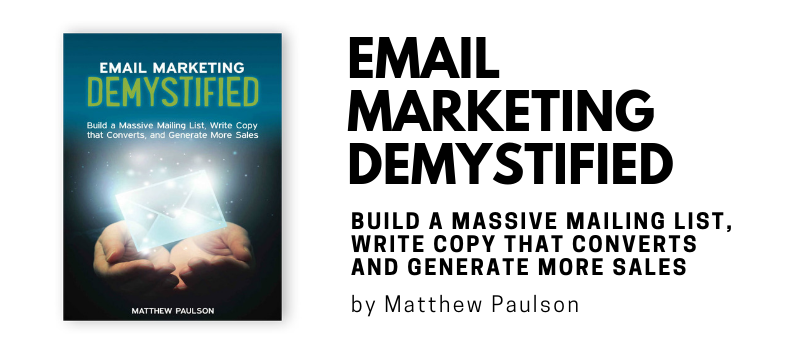
5. Email Marketing Demystified – Matthew Paulson
In this well-reviewed book, email marketing expert Matthew Paulson gives readers highly effective techniques for growing an email list, creating new revenue streams, increasing sales, writing compelling copy, and optimizing conversion funnels. His years of experience organically building an email list with more than 400K followers has helped him examine what works and what doesn't, and he shares those strategies so the reader can tap into the power of email.
"Email Marketing Demystified is a great primer. I thought the book was a really great primer for anyone that doesn't understand the mechanics of the process of email marketing."
Perry Belcher, Co-Founder, digitalmarketer.com.
Developing strong email marketing campaigns is key to expanding your target audience and retaining existing consumers. We hope these books help you create the most powerful campaigns, and if you have read any other helpful books, share those with us on @Mailjet on Twitter!







